Given today’s fast-paced world, critical thinking is more essential than ever. As children grow, they need strong reasoning skills to face life’s challenges, make informed decisions, and thrive in various aspects of life. Preparing children to solve problems early helps them overcome obstacles with confidence. After-school care plays a crucial role in sharpening these skills.
Why Is Critical Thinking Important for Young Minds?
Critical thinking involves analyzing information, evaluating perspectives, and synthesizing knowledge to make reasoned decisions. This skill helps children become better learners while fostering personal growth.
- Enhances Learning – Kids with strong critical thinking skills engage in meaningful conversations, challenge assumptions, and solve problems with an open mind.
- Encourages Independence – When children think for themselves, they develop a natural curiosity and desire to learn.
- Improves Social Skills – Exploring different viewpoints helps children understand complex social situations and communicate effectively.
How Does Problem-Solving Get Kids Ready for Future Challenges?
Problem-solving is a crucial part of critical thinking. Children must first recognize a problem before they can work toward a solution. Learning this process prepares them for life’s uncertainties.
- Builds Resilience – Facing challenges teaches kids that obstacles are learning opportunities, not failures. Developing a growth mindset helps them adapt and grow.
- Boosts Confidence – Overcoming difficulties strengthens self-belief, making children more prepared for academic, social, and career challenges.
- Encourages Teamwork – Working with peers to find solutions improves collaboration and helps kids appreciate different perspectives. These skills become valuable in adulthood.
What Role Does After-School Care Play in Cognitive Growth?
After-school care provides a structured space for children to engage in enriching activities that develop cognitive skills. Programs often include academic support, creative projects, and critical thinking exercises that complement school learning.
- Expands Interests – Kids explore new activities in a supportive environment, encouraging creativity and innovation.
- Enhances Emotional Intelligence – Social interactions help children understand emotions and make thoughtful decisions.
- Provides Real-World Problem-Solving – Resolving peer conflicts and working on group projects strengthen critical thinking skills, preparing kids for future challenges.
Conclusion
Building critical thinking and problem-solving skills is essential for every child’s success. When we nurture these abilities, we equip young minds with the tools they need to handle future challenges. After-school care plays a key role by offering structured opportunities for children to explore, grow, and develop important life skills.
Learn more about our Premium Student Care program and how it can support your child’s development. Visit our website for more details.
FAQ
1. Why is critical thinking important for young minds?
Critical thinking is vital for young minds as it enhances their ability to analyse information, make informed decisions, and engage in thoughtful discussions. It fosters curiosity and creativity, which are essential for academic success and personal growth.
2. How does problem-solving prepare kids for future challenges?
Problem-solving teaches children resilience and a growth mindset. It equips them with essential life skills, boosts their confidence, and encourages collaboration, all of which are crucial for navigating future challenges in various aspects of life.
3. What role does after school care play in cognitive growth?
After-school care provides a structured environment that promotes cognitive growth through educational activities, social interactions, and real-life problem-solving experiences. It nurtures creativity and critical thinking, preparing children for the complexities of the world.

